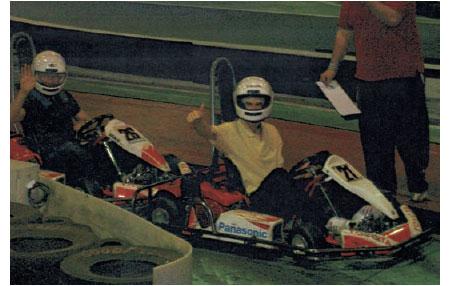Hitting Back (21 page)
Authors: Andy Murray
I played two rounds in Moscow and then came home for a
week when the whole gambling issue erupted. The headlines
were completely untrue. 'Tennis Is Fixed, says British No 1
Murray' and 'Murray Taking Flak For Fix Claim'. I could have
done without it. Nikolay Davydenko, the Russian player under
investigation after retiring from a match at the Polish Open,
came out and said: 'If Murray says that he knows, that means
he gambles himself because people who start talking out loud
have their fears disappeared.' I wasn't quite sure what that
meant but I could tell he wasn't happy. Even Rafael Nadal said
he thought I'd gone overboard. 'I don't think anything like that
happens. Everyone gives it 100 per cent and there are no fixed
matches.'
For the record: I still have the feeling that if you are ranked
100 in the world and someone comes to you and says: 'Here,
you can make $200,000 if you lose a match' then someone
might be tempted. But so far no one's been banned for
throwing matches or betting in large amounts. Players have
come out and said they've been approached but all of them
have turned the offers down. That is obviously good for the
sport. We can't say that players are guilty of match-fixing
unless someone is found guilty of doing it and that hasn't
happened.
But we cannot ignore the problem either. At one of our ATP
tennis meetings in Miami, in 2007, we had a visit from a guy
from the American Mafia. He explained to us how wrong it
would be to get involved with these people. If you do something
for them once, they're not going to let you go. They'll approach
you many more times and it's very tough to escape.
Obviously there were investigations going on then, otherwise
there would have been no point in organising a visit from an
ex-Mafia informant who'd spent time in jail. He said he'd
turned his life around and warned us that anybody getting
involved in this kind of business was in big trouble if they were
caught. He was pretty authentic and looked the part because he
wore sunglasses all the time. He made sense, and I thought it
was a good idea for him to speak to us. Some of the other
players didn't, they thought it was a bit extreme, but later
events proved that there was a problem and something needed
to be done to try and address it.
The controversy rumbled on. It was still with me when I
arrived in Madrid but I had a good clear-the-air talk with
Nadal, who understood how these things can happen in the
media, and with that pressure off my shoulders I then played
my best tennis of the year to beat Radek Stepanek in the first
round, followed by Juan Ignacio Chela in the second. Both of
them were fairly easy straight-set victories. I played so well
against Stepanek that he never once reached deuce on my serve,
and I would say it was probably one of my best matches since
turning pro.
Maybe it was fate that my next opponent was Rafa Nadal,
in front of his home crowd, playing only his second match
since hobbling away from the fourth round of the US Open
with knee problems. We hadn't met since that epic match in
Melbourne, and this one followed the same up-and-down
route. I slammed down a few aces, then lost my serve to love
to go 6–5 down. I levelled when he failed to win a point on his
next service game and then he won the first-set tie-break with
a gigantic leap of celebration while 10,000 Spaniards went
mad. He won the second set 6–4 but only after a battle.
It was another really great match between us and I wasn't
too disappointed when I met Brad, my mum and Leon afterwards.
I felt a little tired after playing three weeks in a row –
Metz, Moscow and Madrid – but I wasn't even thinking about
my wrist any longer. I was feeling more and more confident
about how hard I could hit the ball again and moved on to St
Petersburg with every hope of doing well.
This was only the seventh tournament I'd played since the
injury, and winning it was a very good effort. I had an
unbelievably tough draw as well. Playing two Russians in
Russia is always going to be tough and after beating Dmitry
Tursunov in the quarter-finals, I came back against Mikhail
Youzhny after saving one match point. Later, my Mum said
she cried with relief when I beat Fernando Verdasco 6–2 6–3 in
the final because it meant I was back to my old self. I was
playing well and winning again.
I am sure it is just a coincidence, but I've noticed that every
time I've won a tournament there has hardly been any British
press there. It's either been a long way from home, like San
José, Qatar or St Petersburg, or else one of the smaller tournaments
such as Marseilles. I am not reading anything into this.
It is just something that struck me at the time.
I still had a chance of making the Masters Cup, the lucrative
end-of-season tournament for the top eight players in the
world, this year being played in Shanghai. I still had to keep
winning and a couple of players in front of me had to lose, but
I had my passport stamped with a Chinese visa just to be on
the safe side. Six of the eight places were already taken but the
chance to win $1 million was worth shooting for.
It came down to Paris: if I won Paris, I'd reach Shanghai, and
it turned out to be eventful. First there was the car crash. It was
funny that a couple of weeks before, when we were being
driven round Moscow, I'd asked Brad if he'd ever had an
accident in one of the tournament cars during his career, as
some of the driving overseas is pretty suspect. He said he'd had
a couple. I told him I'd never had one. 'Be careful what you
say,' he'd said.
He was obviously right about that. We were on our way to
the hotel in Paris in the pouring rain when our car braked
suddenly and the guy behind absolutely nailed the back of the
car. We were lucky we were in one of the big Mercedes people-carriers
that they use at tournaments because we were basically
fine. But the impact of the crash was really loud, and for a split
second we had no idea what had happened. The front of the
car behind us was pretty badly damaged.
Actually, it wasn't quite true to say I'd never been in car
crash, but it wasn't in a tournament car. It was in a New York
taxi and I knew as soon as I got in the back that I had a dodgy
driver because before I even shut my door he was trying to beat
the red light in front of us. At the next set of lights, he stopped
and another cab piled into the back of us, probably trying to
run the red light himself. It was a pretty hard hit and as I didn't
have my seat belt on, I went flying into the perspex window
behind the driver and hit my head. I climbed groggily out of the
car and the driver demanded five dollars for the fare. I couldn't
believe it. I said: 'What? I've just got my head smashed!' I
ended up paying though. The two drivers were really snapping
at each other and I thought it was probably the safest thing to
do. I may have been the only person ever in New York who's
paid for a one-block ride and a crash.
This crash was obviously not the greatest start to a tournament
I've ever had, and in the third round I was drawn against
one of my favourite players to watch, and a Frenchman, the
Tahiti-born Fabrice Santoro. They call him 'The Magician'
because he has great hands and plays a wonderfully tricky
game. At 34, he was the oldest man in the World Top-50 but
he had already beaten Djokovic in the previous round, who
turned up for the match in a Zorro mask that he'd picked up
in a restaurant the night before because it was Halloween. It
didn't bring him much luck, but since he'd just had his wisdom
teeth removed maybe he had an excuse.
I played very well to beat Santoro but ended up losing in the
next round to another Frenchman, Richard Gasquet, who was
also trying to get to Shanghai. I was disappointed and tired, not
so much physically as mentally. The Brad thing was still going
on. I wanted to win the match, but things were preying on my
mind. We'd been together for five straight weeks in Europe and
I wasn't enjoying it. I should have been loving life, getting so
close to a place in the Master's Cup – and if I wasn't there had
to be something major wrong. I knew it was time to address the
problem.
Even so, being one match away from Shanghai was a good
effort and I could go away on a two-week holiday to Miami
with Kim feeling relatively pleased with myself. It was just
typical that while I was supposed to be relaxing, I developed
some sort of illness and ended up on a drip. Why isn't life ever
simple?
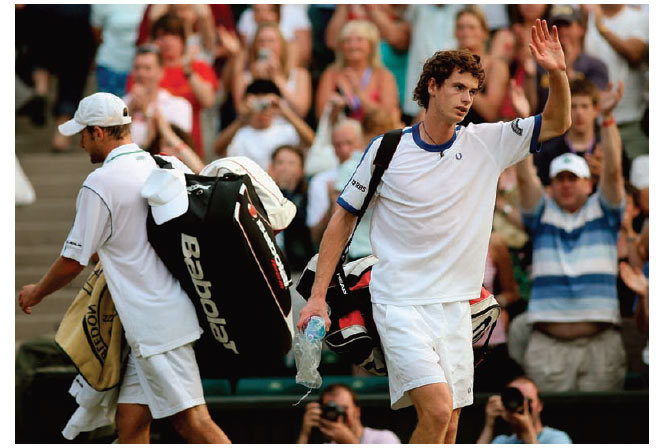
Wimbledon 2006 –
I played great to beat Roddick for
the second time that year...
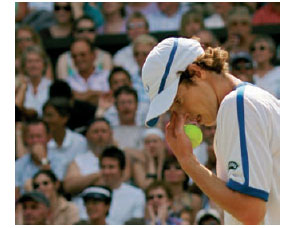
... but it was horrible v Bhagdatis
in the fourth round
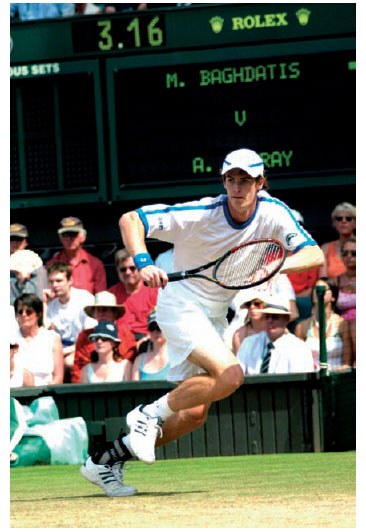
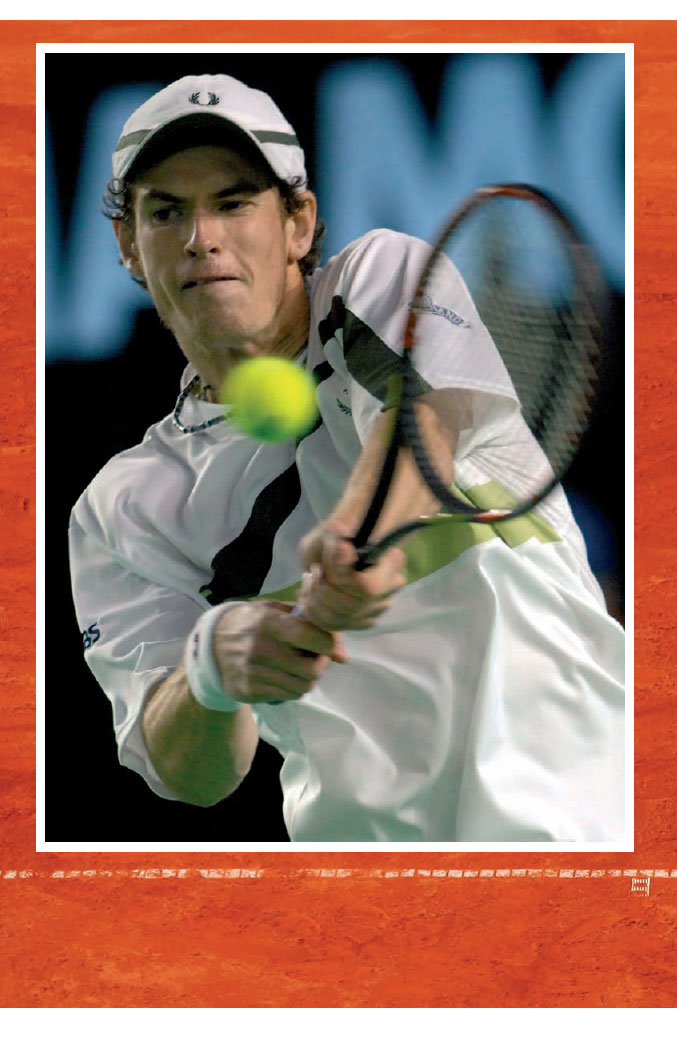
Backhand working well in my five setter v Rafa Nadal in the Oz Open, 2007
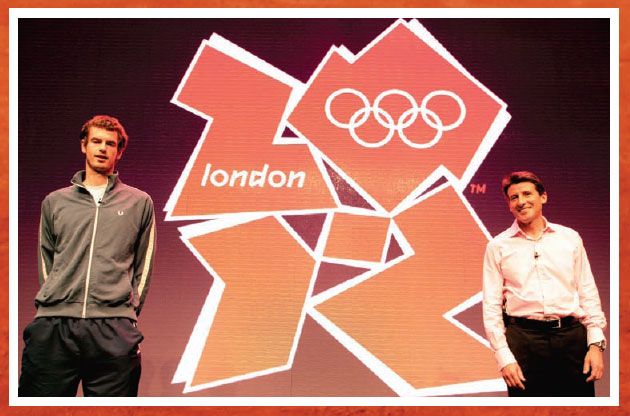
Launching the 2012
logo with Seb Coe
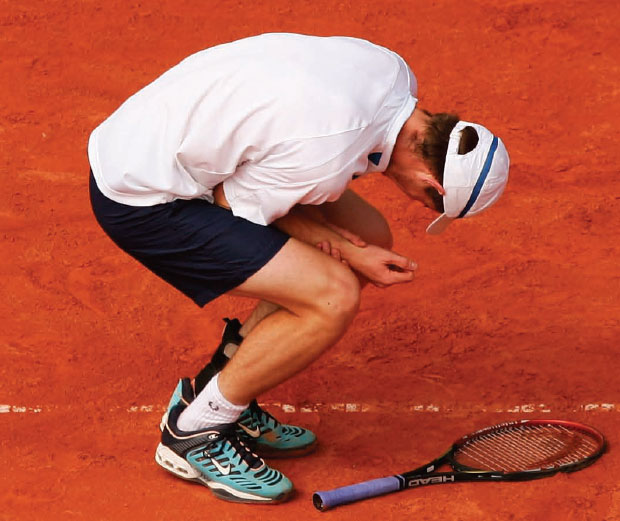
Hamburg 2007 –
wrist gone –
my worst nightmare!
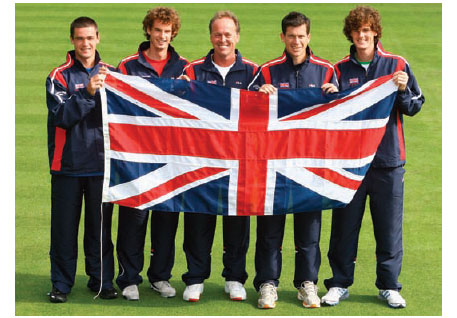
Sept 2007 – Davis Cup
team for World Group
play off v Croatia at
Wimbledon. Tim's final
match
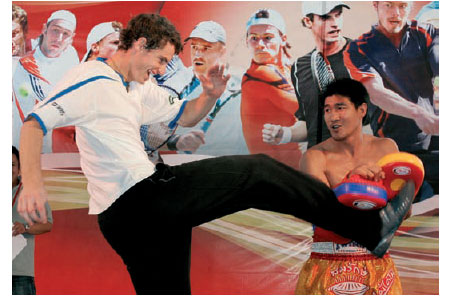
A spot of kick boxing
at the Thailand Open
in Bangkok
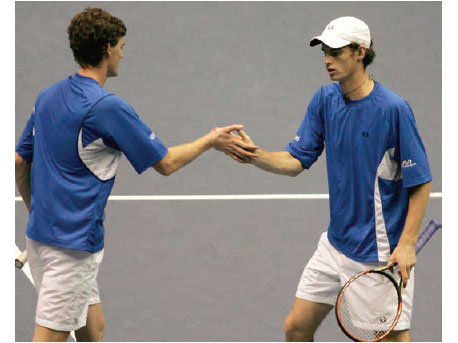
It's great to have
your bro on tour –
on and off court
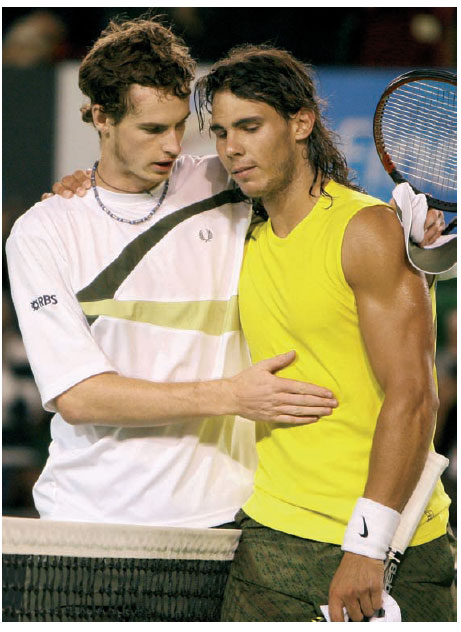
Me and Rafa at the
end of court 0z Open
epic, Jan 2007
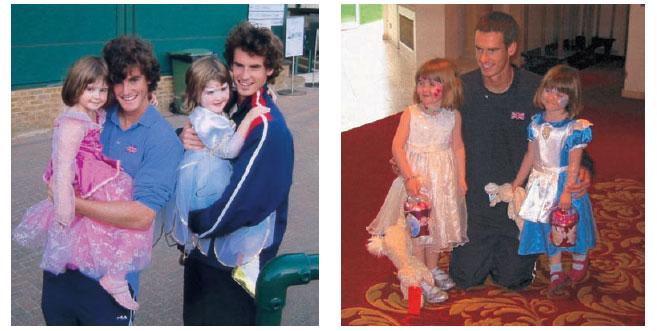
With our twin cousins Cora and Ailsa in fancy dress – them, not us

Wimbledon 2006 –
chatting to boxing
friend Alex Arthur in
the player lounge after
the Roddick match
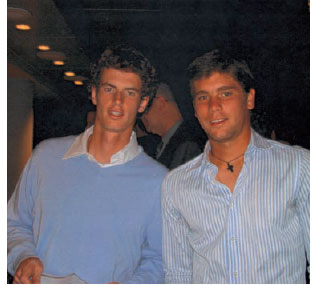
With Dani
Valverdu, great friend
and doubles partner in
my junior days
